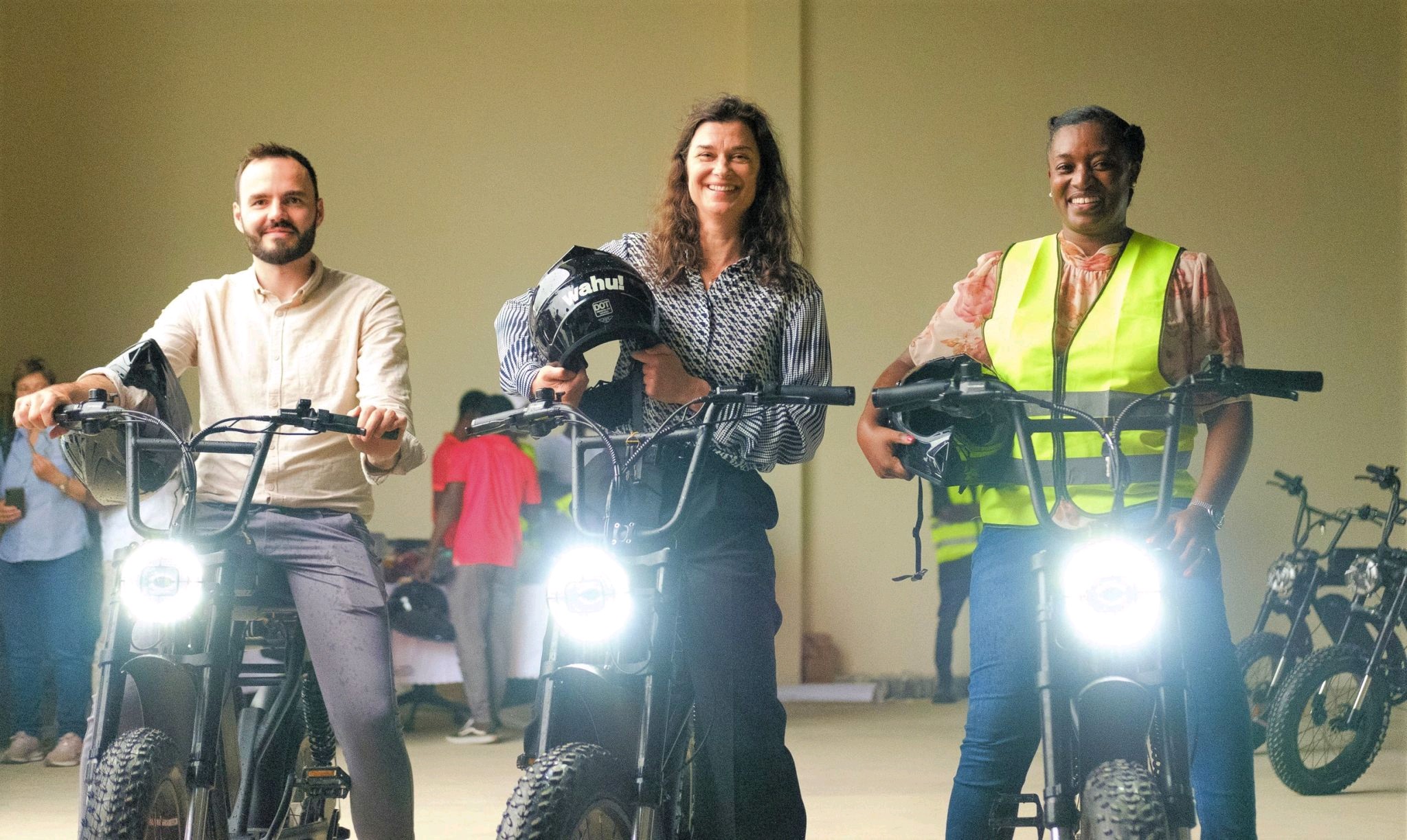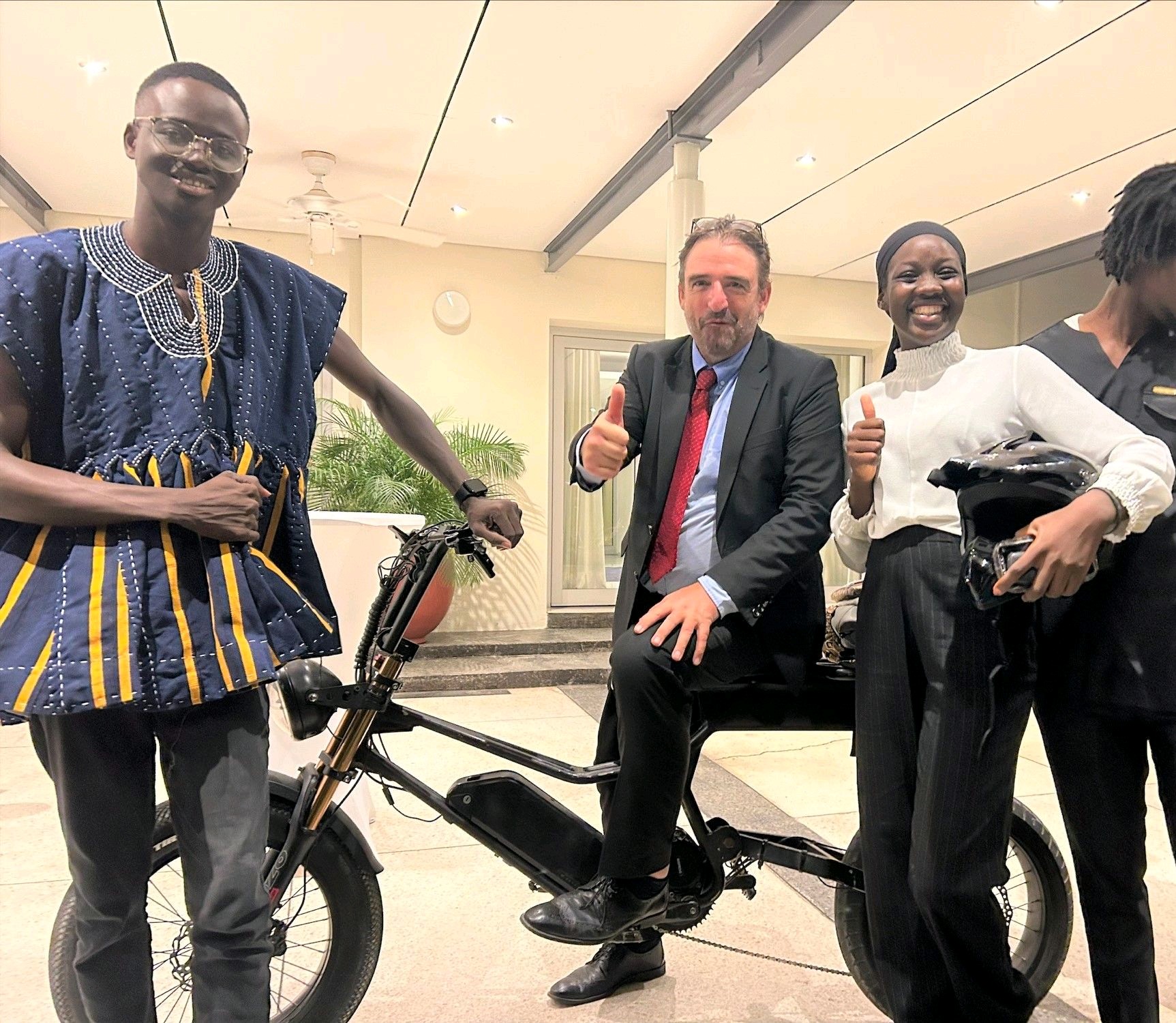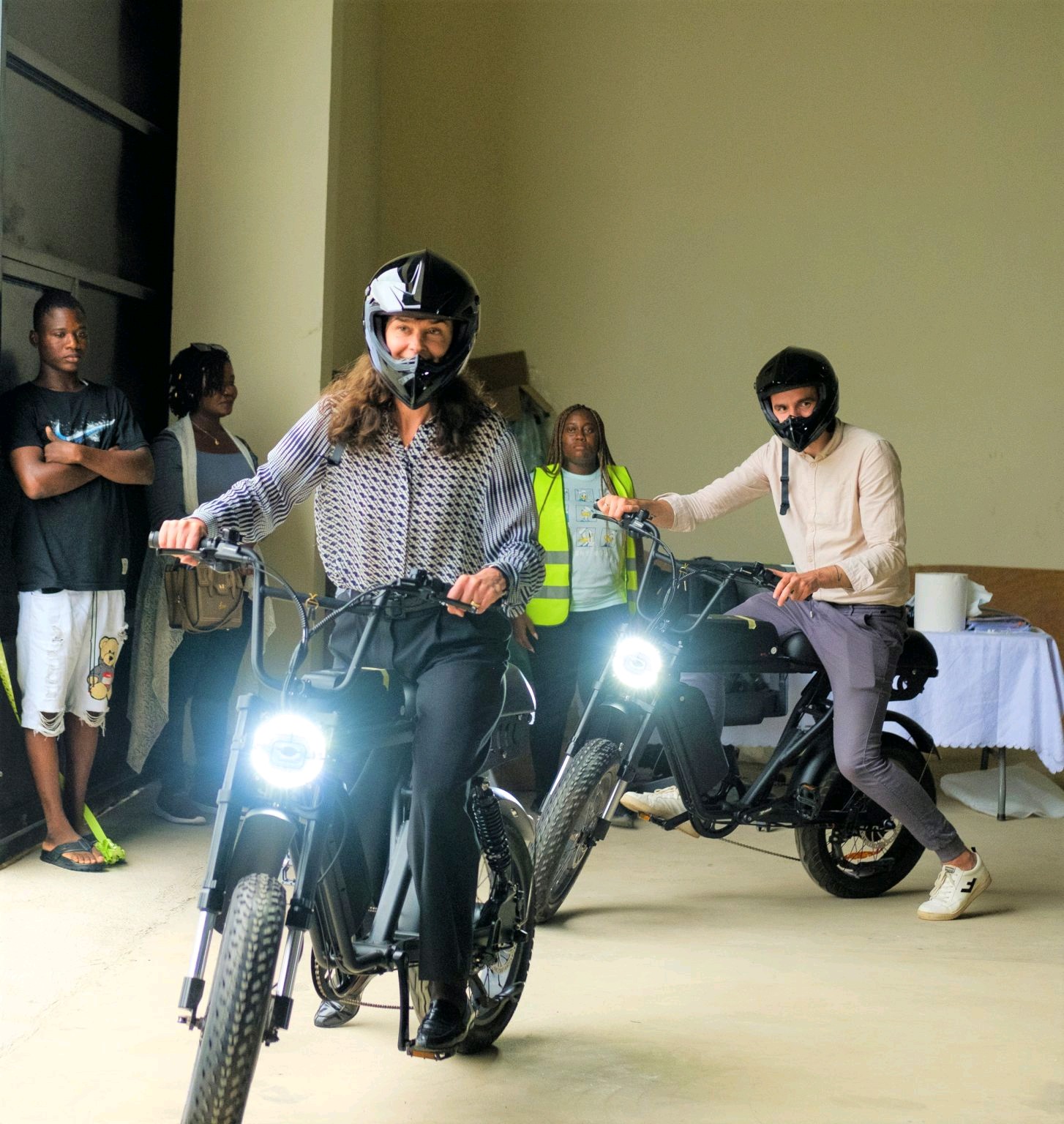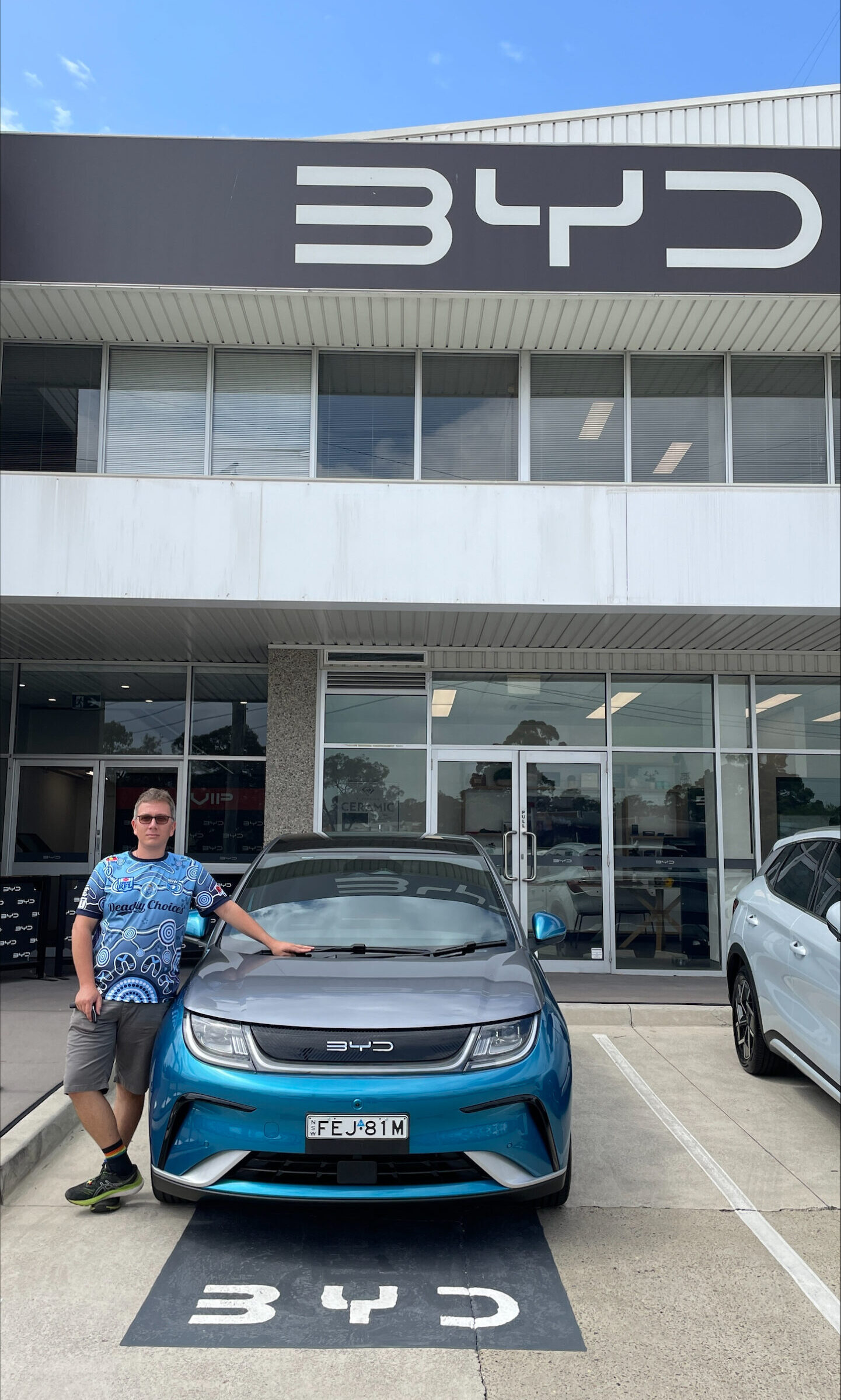
The transition to electric mobility is now well underway in a lot of countries around the world. There has been significant progress in the electric bus, electric car, electric scooter & motorcycle, and electric bicycle sectors over the past decade. There is also now some significant traction in various areas on the African continent. To help accelerate the shift to more accessible and sustainable transport options, local development and assembly and ultimately manufacturing of these more sustainable vehicles will be critical. Sufficient funding must also be channelled towards research and development of locally suitable, scalable, and sustainable solutions — as well towards the associated technical assistance.
Siemens Stiftung and Impact Hub Accra are helping to catalyse this in Ghana. Together they are implementing the e-cargo bikes “Made in Ghana” project co-funded by the German government’s International Climate Initiative (IKI). The project aims to help facilitate the decarbonization of transportation in Ghana by testing business models, building appropriate charging infrastructure to establish an electric mobility platform, and bringing relevant stakeholders to drive e-mobility solutions in the region.
Impact Hub Accra is a social entrepreneurship and innovation centre in Ghana. The Impact Hub’s mission is to support inclusive growth in West Africa through the creation of a resilient and dynamic social innovation ecosystem. “Sustainable mobility and transport are vital to achieving Sustainable Development Goal (SDG) 11 on sustainable cities and communities. It also promotes the implementation of other SDGs, such as access to education or health, as mobility is one of the fundamental conditions for sustainable, economic, and societal development in a country. I’m extremely happy to be in Accra today to meet the stakeholders leading the charge for the decarbonization of the Ghanaian economy along with bridging the gap from public transit to the destination by providing last mile connectivity,” explains Dr. Nina Smidt.
Dr. Smidt also joined enterprise Wahu’s foundress, Valerie Labi, and commercial lead Victor Bannerman-Chedid at the launch of 60 new electric cargo bikes. Wahu is producing electric vehicles tailor-made for and manufactured in Africa as well as consulting with Impact Hub Accra in piloting the local manufacturing of e-cargo bikes. With the addition of the new fleet to existing transport systems, the social enterprise is furthering to the net-zero initiative along with building local capabilities to produce electric vehicles.
“As a centre for innovation and entrepreneurship, our Net Zero Accra project is dedicated to driving progress in the electric vehicle (EV) gig economy and developing a robust charging network for two-wheel transportation and last mile delivery in Ghana. This project presents a remarkable opportunity to pioneer the exploration of ideas within the electric mobility sector and expand our reach to various practical applications. Collaboratively, we are working with regional institutions, businesses, academics, and administration on technical issues to foster more sustainable, accessible, inclusive, and efficient urban transportation in the country,” adds Will Senyo, CEO of Impact Hub Accra.
As a part of their ongoing initiatives, a Design Sprint workshop with students, graduates, and e-mobility enthusiasts was organized to generate new ideas. Eight winners of the program have joined the Impact Hub Accra team for 12 months to develop their skills and capabilities and to prepare themselves to take the next step in working on practical and implementable electric mobility solutions.
On the research and development front (R&D), Siemens Stiftung has launched a new call for research and development (R&D) to validate and implement products and business models in the e-mobility sector. The call is open for enterprises operative in the e-mobility value chain in Ghana and Uganda. The selected enterprises will conduct R&D projects for 12 months to improve the market readiness of their solutions and increase the social and ecological impact of e-mobility.
Market Gap
Development of a market–tested solution (product, service, business model) from the battery, charging/swapping station, or vehicle and technology value chain (or related value chains relevant to the e-mobility sector) that is filling a gap in the e-mobility sector.
Social & Ecological Impact
Design of a product, service, or business model from the battery, charging/swapping or vehicle and technology value chain (or related value chains relevant to the e-mobility sector) to increase the social and ecological impact.
Ecosystem Services: Development and piloting of relevant “support structures” (e.g., hubs, labs, recycling and, financing) that are essential for the scaling and uptake of e-mobility solutions. The minimum eligibility criteria for enterprises include:
- Registered and operative in Ghana or Uganda
- Market experience in Ghana or Uganda
- A market-tested prototype which attracted first users and clients
- Demonstrate the social and/or ecological impact
- Operative in the battery, charging/swapping or electric vehicle and technology value chain
- No pending litigations against the enterprise or its management team
These types of initiatives are great, but it’s always good to see them having real long-lasting impact. It’s great to see that the programmes have a key focus on scalable, replicable projects that could make them sustainable and not just once-off projects.
Seeing Wahu, formerly known as MANA Mobility, launch 60 bikes is really encouraging. As it grows its footprint and scales its production along with all the other players that are active in this sector, this will help catalyse the growth of other players in the associated downstream industries lifting up the whole ecosystem and creating the much needed employment opportunities. I am looking forward to following the developments around this “Made In Ghana” e-cargo bike programme and similar initiatives around the continent.
Sign up for daily news updates from CleanTechnica on email. Or follow us on Google News!
Have a tip for CleanTechnica, want to advertise, or want to suggest a guest for our CleanTech Talk podcast? Contact us here.
Former Tesla Battery Expert Leading Lyten Into New Lithium-Sulfur Battery Era — Podcast:
I don’t like paywalls. You don’t like paywalls. Who likes paywalls? Here at CleanTechnica, we implemented a limited paywall for a while, but it always felt wrong — and it was always tough to decide what we should put behind there. In theory, your most exclusive and best content goes behind a paywall. But then fewer people read it! We just don’t like paywalls, and so we’ve decided to ditch ours. Unfortunately, the media business is still a tough, cut-throat business with tiny margins. It’s a never-ending Olympic challenge to stay above water or even perhaps — gasp — grow. So …






